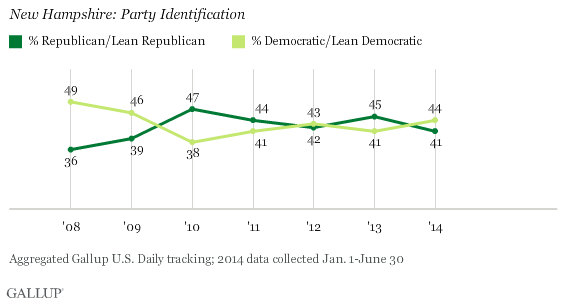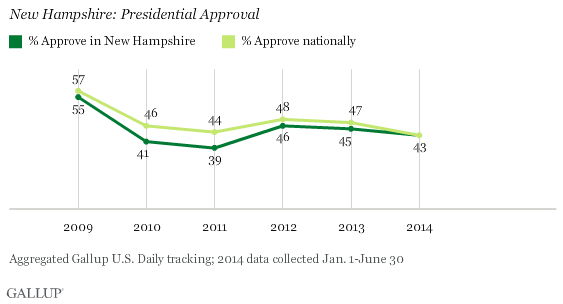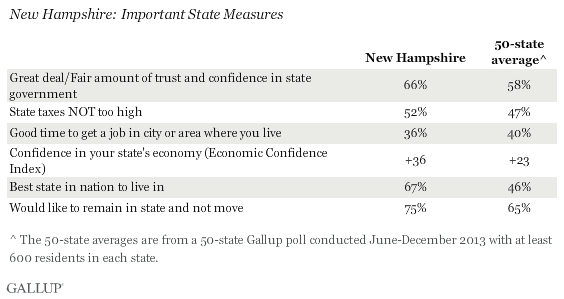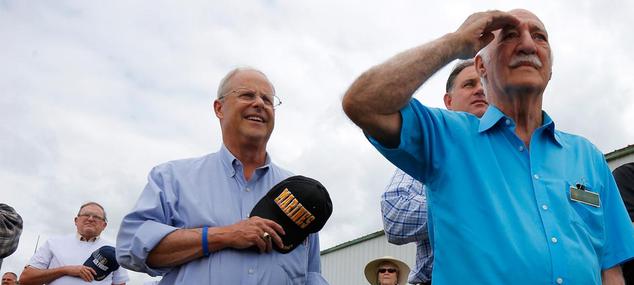Story Highlights
- In New Hampshire, 44% lean/identify as Democratic, 41% GOP
- Most New Hampshire residents believe state is best to live in
WASHINGTON, D.C. -- A hallmark of the current era of politics is that many of the 50 states, indeed a majority of them, have reliable political identities. Their presidential vote is a foregone conclusion, and they typically elect federal officeholders of their preferred brand -- but not so in New Hampshire, one of the most politically schizophrenic states in the nation. In seven years, it has vacillated between a large Democratic lead on party preferences to a clear Republican advantage, and now to a tie.

This year, with a competitive Senate race raising the state's political profile, 44% of New Hampshire residents lean or identify as Democratic, while 41% opt for the GOP.
Granite State politics are far from predictable. The only northeastern state to vote for George W. Bush in 2000, it instead backed Bush's opponent in his 2004 re-election campaign. But things have really heated up recently. In 2008, the state lurched further toward the Democratic column, voting for Barack Obama by about nine percentage points and electing a Democrat to the Senate for the first time in decades, Jeanne Shaheen. That year, Gallup found that almost half of New Hampshire residents leaned or identified Democratic (49%) and, more broadly, Democrats enjoyed a 13-point lead over the GOP.
But New Hampshire residents quickly switched gears, as Republicans took an ample lead in party identification in 2010, mirroring the same general pattern across the country. In that year's midterm election, a Republican was easily elected to the Senate, Republicans won both of the state's seats in the U.S. House and both chambers of the state legislature transferred to GOP control after four years of Democratic management. Then in 2012, Democrats enjoyed a large enough rebound in party support to bring the two parties to parity -- 43% Democratic, 42% Republican. New Hampshire again gave Obama its electoral votes, Democrats regained their seats in Congress and the state House flipped back to the Democrats.
This year, Republicans and Democrats are once more running neck and neck. Shaheen's re-election bid against erstwhile Massachusetts Sen. Scott Brown remains a tight race, with just over a week until Election Day.
As close as the race is, Gallup data suggest that the New Hampshire political environment is somewhat more hospitable to Democrats compared with other states with close Senate races. Democrats at least hold a nominal, if not statistically significant, lead in the state. And President Obama is less of a liability here than in states where his approval rating is below the national average. In New Hampshire, it matches the national average -- still subpar in absolute terms, but not in relative terms.

Majority of New Hampshire Residents Say State Is Best to Live In
Scott Brown, formerly a senator from neighboring Massachusetts, is sensitive to a crippling political charge: the out-of-touch out-of-stater looking for a political launch pad. With 67% of Granite State residents saying New Hampshire is the best state in the country to live in, these attacks -- which Shaheen drove home in the Oct. 20 debate -- could prove especially persuasive to New Hampshire-loving residents. Additionally, three-quarters of New Hampshire residents say they would like to remain in the state and not move, 10 points higher than the 50-state average. In other words, New Hampshire residents are especially happy and content to be in the Granite State, and Brown's status as a recent arrival may hinder his ability to connect with these proud people. In Brown's defense, far fewer individuals from Massachusetts say it is the best state to live in (46%) or that they would like to remain there (58%). Thus, Brown could retort he was acting on a common desire of many Massachusetts residents: moving out of the Bay State.

New Hampshire residents give the state strong marks on many other important metrics. According to Gallup's 2013 50-state poll, New Hampshire residents believe their state economy is in good shape and exhibit above-average levels of trust in state government. Accordingly, even as the Senate race remains close, incumbent Gov. Maggie Hassan, a Democrat, looks like a good bet for re-election.
Bottom Line
Political winds shift very quickly in New Hampshire -- probably quicker than in any other state in the country. Democrats swept the major offices in 2008, while Republicans won big in 2010. In the last presidential election, Democrats rebounded, though New Hampshire was considered a battleground state throughout the contest. With just over a week until voters decide on a crucial Senate election, Granite State residents' party leanings continue to be closely divided, meaning this contest could be decided by a razor-thin margin.
Survey Methods
Results for this Gallup poll are based on telephone interviews conducted June-December 2013 with a random sample of approximately 600 adults, aged 18 and older, living in all 50 U.S. states and the District of Columbia. Results are also based on telephone interviews conducted as part of the Gallup U.S. Daily survey Jan. 1-June 30, 2014, with a random sample of 349 New Hampshire adults, aged 18 and older.
For results based on the 50-state poll and the total sample of adults per state, the margin of sampling error is ±5 percentage points at the 95% confidence level.
For results based on the total sample of New Hampshire residents, the margin of sampling error is ±8.3 percentage points at the 95% confidence level.
In the 50-state poll, each sample of national adults includes a minimum quota of cellphone and landline respondents based on cellphone and landline usage in each state. For the Gallup U.S. Daily survey, each sample of national adults includes a minimum quota of 50% cellphone respondents and 50% landline respondents, with additional minimum quotas by time zone within region. Landline and cellular telephone numbers are selected using random-digit-dial methods in both studies.
Learn more about how the Gallup U.S. Daily works.

